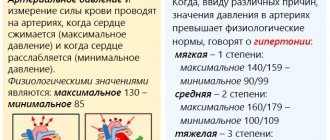The article was checked by a hepatologist, gastroenterologist Fedel S. , is for general informational purposes only, and does not replace consultation with a specialist. For recommendations on diagnosis and treatment, consultation with a doctor is necessary.
At the Clinical Hospital on Yauza, they will quickly find out the cause of poor appetite and other disorders and carry out successful treatment. Qualified doctors - consultants of various profiles, modern examination technologies and expert equipment (ultrasound, endoscopy, endosonography, CT and MRI, all laboratory diagnostics, etc.), an individual approach to each patient ensure the effectiveness of treatment of diseases accompanied by appetite disorders.
Types and causes of occurrence
Loss of appetite can be absolute (anorexia), partial (hyporexia) and reduced (eating food, but in small quantities with a constant feeling of hunger). At the initial appointment, the doctor at the Kuntsevo Medical and Rehabilitation Center identifies one of these reasons that caused the loss of appetite:
- diseases of the intestines, stomach, gall bladder, pancreas,
- infectious diseases,
- helminthic infestations.
In addition, experts note psychological instability and the use of certain medications as the cause of loss of appetite.
Diagnostics
Lack of appetite is observed in many diseases, so the primary examination of the patient is carried out by a general practitioner. To select a set of instrumental and laboratory studies, it is necessary to carefully collect complaints and the history of the development of the disease, and identify the leading pathological syndrome. Next, specific diagnostic methods are prescribed, the most informative of which are:
- Blood analysis
. A standard blood test shows signs of inflammation and anemia, which often indicate a neoplastic cause. Biochemical analysis reveals changes in liver function and decreased excretory function of the kidneys. If the lack of appetite is caused by an infectious process, serological tests are performed to identify the pathogen. - Coprogram
. Macroscopic analysis evaluates the consistency and color of stool, signs of malabsorption syndrome. On microscopic examination, the levels of leukocytes and erythrocytes are elevated, which is a manifestation of inflammatory bowel disease. To establish a diagnosis of dysbacteriosis, stool culture is done. To exclude bleeding, the Gregersen reaction is indicated. - Visualization methods
. Since in adults, lack of appetite is often associated with chronic damage to the gastrointestinal tract, ultrasound of the abdominal cavity, targeted scanning of individual organs, contrast radiography, and FGDS are performed. For renal dysfunction, excretory urography is recommended. To detect tumors and destructive processes, ultrasound of the thyroid gland and adrenal glands is used; in women, the ovaries are visualized. - Neurological examination
. After a standard clinical examination (assessment of eye and tendon reflexes, muscle tone, cognitive functions), additional methods are used. An MRI of the brain is informative, which allows you to detect tumors or other disorders in the area of the sella turcica. If necessary, the patient is referred for consultation to a psychiatrist.
Ultrasound examination is indicated in case of lack of appetite
Which doctor treats loss of appetite
There is no need to ignore such a symptom as decreased appetite. With this problem you need to contact a gastroenterologist.
To make an appointment, choose any method:
- call the clinic +7 (495) 103-99-55,
- order a call back,
- leave a request for an appointment using a convenient form on the website:
Loss of appetite may indicate the development of various pathologies in the patient’s gastrointestinal tract: from helminthic infestation to infectious lesions and disorders at the enzymatic level.
IMPORTANT! In any case, persistent loss of appetite requires consultation with a specialist from the Kuntsevo Medical and Rehabilitation Center. Our experienced gastroenterologists will conduct a full diagnosis to determine the source of the symptom in order to then eliminate the found cause.
Make an appointment with a gastroenterologist at our center - and regain your previous quality of life, without unpleasant alarming symptoms!
SIGN UP
What leads to eating disorders
Often it all starts with psychological dissatisfaction with one’s appearance, complexes about being overweight/underweight. Strict rules for eating are a lot of stress. It is not always possible to comply with all the established limits, and this is fraught with increased anxiety. A complete refusal to eat, fasting, or switching to an unhealthy, dangerous diet is possible. This may occur in people who:
- They are overweight or underweight and hear about it from others.
- They split food into tiny portions.
- Subject to fear of getting fat.
- They ignore snacks when they are hungry.
- Calculate the calorie content of the food eaten.
- They think about food almost constantly.
- Induce vomiting after eating.
- Strictly do not eat fast carbohydrates (baked goods, chocolate).
- Include only dietary products in the diet.
- They absolutely strive to lose/gain weight.
A combination of several symptoms in a person at the same time should alert you. It is important to correctly and timely diagnose the disease and begin psychotherapy, since the consequences of such disorders can be physiologically irreversible (anorexia).
How to increase appetite in an adult, reasons for decreased appetite
When your appetite is good, you don’t think about your health. Emerging problems with appetite or lack of it, apathy, can be a signal of imbalance, imbalance in the body, and sometimes the development of serious diseases and complications. For some, excess weight is a problem, for others, thinness is a problem. Therefore, it is also important for them to normalize weight, restore appetite and stabilize the process of food digestion.
Stages of anorexia
Any neurosis, including anorexia, develops gradually. The trouble is that a person skillfully hides his disorder, and when the truth is revealed, it becomes extremely difficult to help him.
First stage of anorexia
The first stage can last several years. During this time, the patient completely changes his worldview, begins to feel burdened by extra pounds (sometimes non-existent), and thinks through options for losing weight. He is increasingly burdened by his own figure, and any careless hint or joke can lead to disaster.
Anorexic stage
Anorexia neurotic enters the active stage - the person begins to take measures to lose weight. First, all “bad” foods are eliminated, and the body begins to rapidly get rid of excess fluid and fat. Then the weight loss process stops, and therefore the patient takes more drastic measures - he completely refuses to eat. This stage can arise as a result of a mental disorder, bypassing the first stage. Losing weight due to depression is a standard phenomenon.
Cachexia stage
Wear and tear of almost all organs - heart, liver, kidneys, brain, blood vessels. The patient becomes lethargic, inactive, and is constantly freezing. At this stage, treatment is quite long and difficult. The body switches on maximum energy saving mode, so menstruation stops, hair and teeth begin to fall out.
Extinction stage of anorexia nervosa
The nervous system suffers, all systems begin to fail. At this stage, death is possible, and changes in health may be irreversible. As a rule, a person is placed under IVs and machines to support vital functions and replenish the lack of nutrients.
Similar symptoms in other diseases
Sometimes, loss of interest in food can be a symptom of a serious mental illness. For example, appetite in panic disorder decreases so much that a person physically cannot eat. He develops a feeling of disgust at the mere thought of food.
Similar symptoms can occur with depression. Someone in a state of melancholy is subject to constant chewing, someone avoids even thinking about food. Paired disorders are often observed: sleep and appetite disorders accompany each other.
Appetite boosters for children
A variety of dishes will help increase your appetite.
Adults often worry about poor appetite in children. To eliminate these points you need to:
- create the right diet according to age;
- regular walks, outdoor games, acceptable physical activity;
- beautiful design of children's dishes;
- adding dried fruits and fresh fruits to porridge, muesli and other dishes;
- use beautiful plates with pictures. To see the bottom, you have to eat everything on the plate;
- eating at certain times of the day, following a diet;
- the child does not need to be force-fed, as it develops an aversion to food, or even worse, a vomiting reflex;
- do not feed heavily when the child is sick;
- stop snacking between meals with cookies, buns, etc.;
- do not feed the child in a bad mood or when he is naughty;
- diversify the range of dishes;
- Do not add large portions.
Less consumption - less income
Appetite may decrease because the need for calories decreases or metabolism slows down.
This can be caused by: Article on the topic Herbal decoction will help tame your appetite
It's hot outside. The body does not have to expend calories for heating, which means there is no need to consume large amounts of food. In addition, in the heat, the load on the cardiovascular, nervous, and excretory systems increases. And the body decides to make the task easier for itself and not waste energy on digestion.
Inactive lifestyle. Appetite often worsens when a person moves less. For example, when changing a job in which he had to work physically to a sedentary job in an office. Energy consumption decreases, metabolism slows down, and, as a result, the desire to eat decreases.
Elderly age. Over the years, our sense of smell and perception of taste weakens, which means that less digestive juice is produced when we see a dish. The intestines become lazier with age, and constipation may occur. Metabolism slows down, and there is no special desire to eat.
What should I do?
To improve your appetite, you need to approach menu organization wisely. First of all, switch to fractional meals - eat little by little, but every 3-4 hours. Remove heavy foods from your diet: mushrooms, fried and fatty foods. Try to eat more vegetables, fruits, and berries – their acids stimulate your appetite. If there are no contraindications (gastritis, heartburn), you should use spices and seasonings. And of course, you need to work up an appetite - move more, take a walk.
Article on the topic
Four ways to combat wolf hunger
Ways to solve the problem
You can stimulate food cravings in a person by:
- organizing access to your favorite dishes;
- creating a free meal schedule;
- taking certain foods that stimulate appetite (sour berries, citrus fruits, onions, radishes, wild garlic, etc.);
- drinking a small amount of alcohol half an hour before meals;
- taking special medications.
Absolute lack of appetite is a serious problem, the causes of which can be determined by a doctor.
You should not ignore such symptoms. Please follow and like us:
What is anorexia?
This is an eating disorder, which is characterized by a lack of acceptance of one’s appearance, an aversion to food, as well as the desire to lose “extra” weight by all means (eliminating food, inducing vomiting, taking laxatives and diuretics). Very often, the disorder occurs against the background of schizophrenic and psychopathic disorders, and also accompanies diseases of the gastrointestinal tract.
It is noteworthy that anorexia practically does not occur among the stronger sex. This suggests that girls, young women and women are too critical and also perceive criticism regarding their figure quite sharply. The obsessive propaganda of slimness and thinness in the media aggravates the situation.
According to the international classification, anorexia is considered a behavioral syndrome and not a neurotic disorder. Consequently, the phenomenon can be considered a pathological change in behavior, which can cause irreparable harm to health.
How to get your appetite back?
If you have no other complaints other than loss of appetite, it is quite possible that the problem is related to stress. In this case, the normal rhythm of life should be restored. How?
Paul:
Normalize your sleep schedule - the average person needs about eight hours. Be sure to include physical activity in your day. It is clear that for health reasons not everyone can play sports, but everyone can do walking. Another important task is to restore nutrition (easy to say if you have an appetite). Start with something simple: fractional meals in small portions, but six times a day. Observe your condition for 3-7 days. If this helps and your appetite is restored, there is nothing to worry about.
Photo: unsplash.com/@enioku
Stress, although a common cause, is far from the only one. Therefore, in case of loss of appetite, especially if there are other complaints, the nutritionist advises the following:
- Keep a temperature diary. Measure your body temperature twice a day—morning and evening—for a week. And be sure to write it down - it will come in handy when you visit the doctor.
- Measure your weight, and on the same scales. Ideally, do this in the morning on an empty stomach and with a minimum of clothing. Data should also be recorded.
- Analyze and remember what other complaints, in addition to loss of appetite, you had at the same time or shortly before this event. The answers to these questions will also be useful when you see a doctor.
Need strength for something else
Sometimes the body turns off its appetite because more important processes are occurring in it that need to be directed toward.
Intoxication due to illness . When you have ARVI, flu, or other inflammatory diseases, sometimes you don’t feel like eating at all. Microbes and viruses that cause them release many toxins during their life processes. The liver must remove them. Since it is actively involved in the digestion process, the body decides to remove the additional burden from it.
Stress. When we are nervous, the hormones adrenaline and cortisol are released into the blood, which increase heart rate, breathing, and increase sweating. The brain needs to regulate all these processes, and it is distracted from digestion. True, this is typical only for acute stress. If it is hidden and sluggish, many people, on the contrary, try to console themselves with food.
What should I do?
If you don’t feel like eating, during an acute period of illness (against the background of a high temperature), you can get by with vitamin drinks: juices, fruit drinks, tea with honey. But when it gets better, you need to eat so that the body can replenish lost energy. Priority is given to light protein dishes, vegetables and fruits rich in vitamins A and C.
Article on the topic
Why do children love “all sorts of nasty things”? A child's taste and appetite are formed even before birth.
You need to force yourself to eat even after nervous tension. When it subsides, the body is depleted - its resources need to be restored. Products rich in magnesium are especially important for this: nuts, legumes, buckwheat, cabbage, beef.








